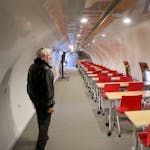A divided St. Paul City Council voted Wednesday to explore a 1% local sales tax to pay for roads, housing and prekindergarten programs.
While council members agreed that the city needs to spend more in those areas and also diversify its funding sources, some said they want to do more work before bringing a proposal to the Legislature.
Council members Rebecca Noecker, Jane Prince, Dai Thao and Nelsie Yang voted for the sales tax resolution. Council President Amy Brendmoen and council members Chris Tolbert and Mitra Jalali voted against it.
The council resolution calls on Mayor Melvin Carter to hire a lobbyist who would talk to legislators and monitor sales tax hearings during the legislative session, which starts next week.
"We know that the status quo is not working," said Noecker, one of the resolution cosponsors. "We sit around this table every year at budget time and we just cannot cut enough to meet these needs."
Brendmoen said she wasn't ready to take this step.
"I fully agree with the spirit of what's behind this resolution. I agree that we need to explore other options for funding," she said. "I'm really concerned that this resolution has predetermined what are our priorities for the city."
Jalali said she supports a local sales tax, but had concerns about the wording and timing of the resolution.
"There are downsides to possibly moving forward with a legislative consultant and doing work ahead of where we're at, in terms of our relationships at the Legislature, arguments we might not be ready to make, or hard questions we might not be ready to answer," she said.
Cities that want to collect a local sales tax have to get approval from the Legislature and then from residents through a referendum. St. Paul officials aren't seeking state approval this session; the lobbyist they hire will report back at the end of May on whether and how to move forward.
St. Paul already collects a half-cent sales tax that pays for economic development projects, including the Xcel Energy Center and CHS Field. The additional 1% tax would generate an estimated $36 million annually — money that would go toward fixing St. Paul's crumbling roads, building and preserving affordable housing and launching an early childhood education initiative for 3- and 4-year-olds.
Minnesota cities are increasingly turning to local sales taxes to fund big projects that local officials say their property tax levies can't bear. St. Paul has raised its property tax levy six times in as many years, including double-digit increases in 2018 and 2019.
Some council members noted the increasing burden of property taxes on residents, as well as the urgency of the issues at hand. Prince, a resolution cosponsor, said the resolution may, if nothing else, send a message to legislators about the city's needs.
"We've got to get real as a state about funding these priorities," she said.
Emma Nelson • 612-673-4509





